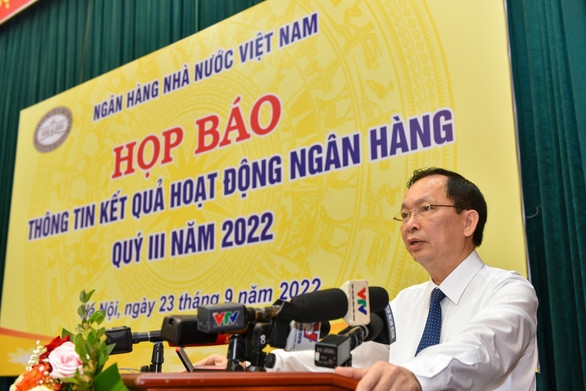That was the affirmation of Mr. Pham Chi Quang, Deputy Director in charge of the Monetary Policy Department - State Bank - at the press conference to inform about the results of banking activities in the third quarter held on the morning of September 23.

Mr. Dao Minh Tu, Deputy Governor of the State Bank, affirmed to continue to manage exchange rates in a flexible and appropriate manner to stabilize exchange rates.
Speaking to the press, Mr. Quang said that in the first 9 months of the year, the Vietnamese Dong lost about 4% of its value compared to the USD, much lower than the currencies of many other countries.
Immediately after the US Federal Reserve raised its benchmark interest rate by 0.75% on September 21, many countries simultaneously raised interest rates. Compared to the end of 2021, currencies that have depreciated sharply against the USD include the Taiwanese USD which depreciated by 13.5%, the Japanese JPY which depreciated by more than 25%, the Philippine currency which depreciated by 13.65%; the Euro which decreased by 13.49%...
"The Vietnamese currency is one of the currencies that has depreciated the least compared to other countries in the region and the world, about 4%," Mr. Quang emphasized.
Immediately after the US Federal Reserve raised interest rates, central banks in countries such as Thailand, Norway, Indonesia, etc. also raised interest rates to control inflation.
Sharing more, Deputy Governor of the State Bank Dao Minh Tu said that the exchange rate management in the context of the USD appreciating very high. A series of countries in the world increasing operating interest rates has been and is affecting Vietnam's exchange rate.
In that context, the State Bank increased the ceiling interest rate on deposits from one month to less than six months by 1%, to 5%/year from today.
"Regarding exchange rate management, the State Bank will continue to operate flexibly and appropriately to stabilize the exchange rate, ensuring reasonable and legal foreign currency supply for businesses and people in need of foreign currency," Mr. Tu affirmed.
In addition, the banking system continues to focus on supporting businesses to quickly restore the economy after the COVID-19 pandemic, thereby contributing to ensuring economic growth according to the National Assembly's target of 6.5% for the whole year.
Will the policy of increasing the ceiling on deposit interest rates cause lending interest rates to increase? The representative of the State Bank said that it will continue to operate the interest rate level stably. Regarding lending interest rates, Mr. Tu informed that the interest rate management must be consistent with the developments of inflation and the domestic and foreign markets.
The State Bank also continues to require credit institutions to reduce operating costs to reduce lending rates for the Government's priority sectors including small and medium enterprises and rural agriculture.
"We also call on commercial banks to cut costs to reduce lending interest rates and share difficulties with customers. This has been done very well by banks in the past two years with an interest reduction of VND25,000 billion," said Mr. Tu.
The credit limit for the whole year continued to be kept at 14%, and has now grown by over 10%.
According to Tuoi Tre